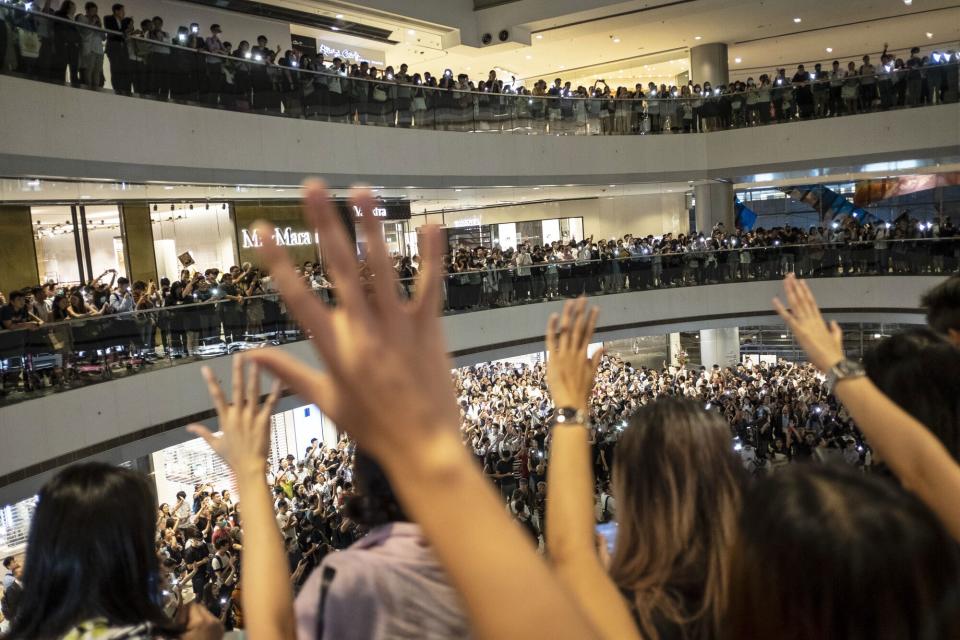Google Blocks YouTube Videos of Hong Kong Protest Song After Court Order
(Bloomberg) -- Alphabet Inc.’s YouTube blocked videos of a Hong Kong protest song in the city, days after a local court approved an injunction order to ban the song.
Most Read from Bloomberg
Iran State TV Says ‘No Sign of Life’ at Helicopter Crash Site
Speedier Wall Street Trades Are Putting Global Finance On Edge
One of the Last Big Bears on Wall Street Turns Bullish on US Stocks
Ebrahim Raisi, Iranian President Confronting West, Dies at 63
The Google video network said it would follow the ruling to make 32 versions of Glory to Hong Kong unavailable to users from the once-freewheeling Chinese city immediately, according to a statement. Attempts to access those videos from Hong Kong on Wednesday resulted in an error message saying, “This content is not available on this country domain due to a court order.”
“We are disappointed by the Court’s decision but are complying with its removal order by blocking access to the listed videos for viewers in Hong Kong. We’ll continue to consider our options for an appeal, to promote access to information,’ a spokesperson for YouTube said.
When asked about YouTube’s move at a regular press briefing in Beijing, Chinese Foreign Ministry spokesman Wang Wenbin said that “stopping anyone from instigating practices that provoke secession and humiliating the anthem is our legitimate and necessary measure.”
Some versions of the song that were not specified for removal in the judgment remained accessible.
Officials had urged Google to delete such videos after the Court of Appeal granted an injunction that holds platforms responsible for hosting the song, exposing global internet companies to new legal risks. The search engine giant’s concession hands a tentative victory to a government that has taken wide-ranging measures to stifle dissent, including making a new domestic security law that brought Hong Kong in line with China’s vague legislation around state secrets and espionage.
While existing laws already punish people for playing the song on seditious charges, the government sought to erase it from platforms, fanning fears of broader censorship controls.
The injunction represents a potent new tool for the government to order the mass removal of content. In granting the ban, judges argued that prosecuting individuals for violation isn’t enough to deter people from using the song to incite secession or insult China’s national anthem. Tech platforms could be held in contempt of court if they didn’t comply with the injunction and face penalties including fines, legal experts said.
Hong Kong’s Secretary for Justice Paul Lam had urged Google to remove the song just days after the injunction was handed down. “Any responsible commercial business or internet service provider would not want their platform to be used by people for illegal acts,” he said on a radio program on Sunday.
Created during the 2019 anti-government protests, Glory to Hong Kong has been erroneously played at several international sporting events instead of the Chinese national anthem, March of the Volunteers.
The government had since at least 2022 asked Google to remove the song, with prosecutors specifying particular YouTube videos for removal. The company had refused to do so until the injunction.
Google and other firms have said that they abide by local laws and regulations wherever they operate. That includes taking down content in countries like Thailand and India that have strict content regulations.
The US company has hundreds of employees in Hong Kong, mostly for selling ads and marketing, and would need to reorganize its regional business operations if it had to pull out from Hong Kong. Earlier, the Asia Internet Coalition — an industry association that counts Google, Apple Inc., Spotify Technology SA, and Meta Platforms Inc. as members — said it was assessing how the court decision will be implemented to determine its business impact.
Google’s decision is likely to fan fears that China’s sweeping censorship controls are creeping into Hong Kong. Unlike mainland China, the former British colony does not block foreign social media or search engines.
Hong Kong’s relative free flow of information is a key draw for global businesses. Restrictions to foreign tech firms in the city could set back efforts to bolster its image as a global finance hub, which took a dent after years of Covid curbs and a Beijing-imposed security law.
The affected videos included those posted by the official account of the song’s composer, known as “ThomasDGX & HongKongers.” Several versions of the song were still locally available on Spotify and Apple Music as of Wednesday.
--With assistance from Allen Wan and Philip Glamann.
(Updates with comment from China’s Foreign Ministry.)
Most Read from Bloomberg Businessweek
Netflix Had a Password-Sharing Problem. Greg Peters Fixed It
Millennium Covets Citadel-Size Commodities Gains, Just Not the Risk
Walgreens and CVS Are Trying to Fix America’s Flailing Pharmacies
©2024 Bloomberg L.P.

 Yahoo Finance
Yahoo Finance 

